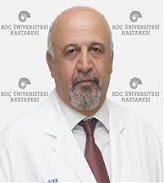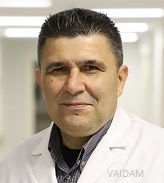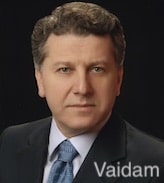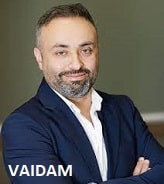A condition of the brain where the cerebrospinal fluid is being accumulated abnormally in the brain and ventricles is called hydrocephalus.
This extra fluid tends to put pressure on the brain and nervous system, causing a lot of trouble and symptoms like
Large head size is seen in infants as their skull bone is not fused.
To treat hydrocephalus, immediate drainage of CSF fluid is arranged by surgically inserting a tube or shunt to drain out the excessive fluid.
This tube is monitored till the symptoms subside and the patient is kept on regular follow-up.
Medicines are given which are diuretic in nature and help in flushing out the excessive fluid.
Hydrocephalus Treatment cost in Turkey is between USD 5400 to USD 6600. Patient has to stay in the hospital for 7 days and outside the hospital for 10 days. The total cost of the treatment depends on the diagnosis and facilities opted by the patient.The cost of Hydrocephalus Treatment includes:
Preoperative diagnostic tests cost (X-ray or MRI may be done)
Surgery cost
Type of surgery (surgical shunt implantation or endoscopic third ventriculostomy)
Post-Operative cost (depends on the number of follow-up sessions)
Medicine cost (antibiotics, painkillers, etc.)
Patient's hospital stay (may need to stay for 2-4 days)
The overall cost of the procedure also varies based on the patient's condition and preferences. Some of these factors are:
Type of hospital and room opted (General, Twin sharing or single room)
The severity of the disease
Post-surgical complication, if it happens (such as Walking problems, mild dementia, and bladder control issues usually show some improvement within days after surgery)
Cost of Blood products (if required)
Age of the patient
An extended stay at the Hospital
Cost of Accommodation during follow-ups, in case the patient is not a local resident
Listing approximate price of Hydrocephalus Treatment and some related procedures. The prices may change depending upon the centers and condition of the patient.
| Treatment name | Cost range |
|---|---|
| Hydrocephalus Treatment | USD 5400 to USD 6600 |
| VP Shunting | USD 4050 to USD 4950 |
| Ventriculostomy | USD 22820 to USD 27891 |
MRI scans and CT scans are required to confirm a diagnosis of hydrocephalus present from birth, and that develops later in children and adults.
All the medicines are included in the package during the time frame when the patient is in the hospital. The medicines that are consumed outside the hospital when the patient is discharged are not covered in the package.
Two surgical treatments are used to treat hydrocephalus: surgical shunt implantation and endoscopic third ventriculostomy. After the shunt implant, you will be observed for 24 hours and need to stay in the hospital for 2-4 days. You also need to stay in the hospital for 2-3 days after the endoscopic third ventriculostomy. The first follow-up after these surgeries is scheduled after 3 months, and a CT scan or MRI should be done at that time. If you have hydrocephalus, you need a shunt system for regular monitoring for the rest of your life.
For patients planning to travel abroad it is useful to know the price in destinations popular with medical travellers. The price for Hydrocephalus in different countries is approximately:
The doctor for treating such conditions are Neurosurgeons, Head and Neck surgeons, and Pediatric Surgeons.
Listing popular specialists:

Chairman, 31 years of experience

Glioma, Movement disorders, Skull injuries, Nervous disorders, Spine tumors, Herniation

Consultant, 28 years of experience

Lumbar hernia, Neck hernia, Waist Shift (Spondylolisthesis), Lumbar Stenosis, Tumors of the spinal cord, Pituitary tumors, Brain Tumors, Brain Bleedings, Brain Aneurysms, kyphosis, Low Back Pain, Non-Surgical Treatment of Low Back Pain, Non-Surgical Treatment of Lumbar Hernia, Low Back Pain Treatment with Epidural Injection, Caudal Epidural Injection, Transforaminal Injection, Nerve Congestion Diseases, Carpal Tunnel Syndrome (Wrist Nerve Stress), Kubel Tel Syndrome (Nerve Stress in Elbow), Laser Microdiscectomy

HOD, 37 years of experience

Brain Surgery Tumor Surgery

Consultant, 20 years of experience

herniated discs, scoliosis, disc space narrowing, neurosurgical rehabilitation.

Professor, 33 years of experience

EEG (Electroencephalography) Discectomy Carpal Tunnel Syndrome Waist Shift Foot Pain Gullian Barre Syndrome Thoracic Outlet Syndrome Spine Fracture Brachial Plexus Deep Brain Stimulation Treatment of neck hernia without surgery the Epiduroskop Treatment of herniated disc without surgery Neck hernia surgery microdiscectomy

Associate Professor, 25 years of experience

Neurology Oncology

Professor, 28 years of experience

Spine and Spinal surgery, Spinal deformity surgery, Brain, Spine and Spinal cord tumors, Neurovascular surgery, Neurotrauma

Professor, 28 years of experience

Intracranial hemorrhage Intracranial venous malformations Lumbar spinal stenosis Malignant peripheral nerve sheath tumors Medulloblastoma Meningioma Metachromatic leukodystrophy Movement disorders Moyamoya disease Multiple endocrine neoplasia, type 1 (MEN 1) Multiple sclerosis Myoclonus Nasal and paranasal tumors Neurofibromatosis Oligodendroglioma Parkinson's disease Pediatric brain tumors Peripheral nerve injuries Peripheral nerve tumors Peripheral neuropathy Pituitary tumors Scoliosis Seizures Spina bifida Spinal arteriovenous malformation (AVM) Spinal cord injury Spinal cord lymphoma Spinal cord tumor Spinal stenosis Stroke Subarachnoid hemorrhage Subdural hemorrhage Tourette syndrome Transient ischemic attack (TIA) Trigeminal neuralgia

Professor, 27 years of experience

Brain tumors, Vascular diseases

Professor, 31 years of experience

Intracranial tumors, Aneurysm, AVM surgery

Senior Consultant, 30 years of experience

Neck hernia Brain Tumors Brain Vein Occlusion Scoliosis Pituitary Adenoma aneurysms Spondylolisthesis (Waist Shift) Herniated disc Spinal Cord Tumors Hydrocephalus Celebral hemorrhage Clot Discard Brain Vein Occlusion Treatment Pituitary Gland Tumor

Consultant, 28 years of experience

Spinal Surgery Neurooncology Functional Neurosurgery Carpal Tunnel Syndrome Waist Shift Gillian Barre Syndrome Thoracic Outlet Syndrome Spine Fracture Deep Brain Stimulation

Consultant, 33 years of experience

Nervous System and Skull Base Tumors Cerebrovascular Diseases Surgery Brain Surgery Tumor Surgery

Consultant, 28 years of experience

Movement disorders - Tremor Dystonia Neurostimulation (brain pacemaker) applications Surgical treatment of pain (trigeminal neuralgia, cancer pain, facial pain, lower back and leg pain) Surgical treatment of Brain Tumors

Associate Professor, 29 years of experience

• Glial tumors • Meningiomas • Pituitary gland tumors • Metastatic brain tumors • Skull base tumors • Pontocerebellar corner tumors • Pineal tumors • Intra-ventricular tumors • Spine diseases surgery • Cervical, thoracic and lumbar spine fractures • Spine and spinal cord tumors • Scoliosis • degenerative spine diseases • Peripheral nerve disease surgery • Peripheral nerve tumors • Entrapment neuropathies • Carpal tunnel syndrome • Ulnar gutter syndrome • tarsal tunnel syndrome • Functional neurosurgery and pain surgery • Trigeminal neuralgia • Mikrovaskülerdekompresyo's • Epilepsy surgery • Spasticity surgery

Consultant, 20 years of experience

Skull base Neurosurgery,, Vascular Neurosurgery (Open & Endovascular),, Craniovertebral junction surgery, Neuro-Oncology (Awake Surgery, Brain Mapping and Intraoperative monitoring)

Consultant, 10 years of experience

Neurooncology, Skull Base Surgery, Neurovascular Surgery, Spine Surgery, Herniated Disc, Neck Hernia, Peripheral Arterial Interventions, Neuroanatomy

Consultant, 17 years of experience

Vagus Nerve Stimulation, Spondylolysis, Spondylolisthesis

Consultant, 26 years of experience

Lumbar Neck Hernia, Intra-Disc RF Ozone Injection, Pediatric Neurosurgery, Congenital Anomaly Surgeries, DBS Surgery (Parkinson)

Consultant, 43 years of experience

Pituitary Gland Surgery, Skull Base Surgery, Brain Tumor Surgery, Spinal Surgery, Vascular Surgery
The success rate is highly variable, and it depends upon a lot of factors, like
In general, the survival percentage is 24-75%.
Our Services for Hydrocephalus Treatment in Turkey
Transparent - Professional - Without Hassles






NABH Certified Healthcare Discovery Platform
Vaidam is NABH certified healthcare discovery platform that will connect you to top-notch medical experts, hospitals, wellness options, and trusted travel partners to help identify and make the right healthcare choices.

Researched & Personalized Treatment Plan - Under One Roof
You can search for the best hospitals, read about them, view photographs of the facilities at the hospitals and the places at which the hospitals are located, and check the cost of treatment.

Quality Treatment Within Your Budget
As soon as you post an enquiry, the patient relation team will collect details from you, share them with the doctors and hospitals on Vaidam's panel, and get a personalized treatment plan. We research to get quality treatment within your budget.

Treatment to Travel
Vaidam concierge assists patients, to get medical Visa, the best airline fares and arrangements for your stay. Our concierge also helps you with daily travel, language, and food concerns. Vaidam does everything to be your perfect host. All of Vaidam’s services are free of cost to patients.

International Reach
Vaidam Health has network in 15+ countries, which includes India, Turkey, UAE, Germany, South Korea, Thailand, Malaysia, Spain.
Note: Vaidam Health does not provide medical advice, diagnosis or treatment. The services and information offered on www.vaidam.com are intended solely for informational purposes and cannot replace the professional consultation or treatment by a physician. Vaidam Health discourages copying, cloning of its webpages and its content and it will follow the legal procedures to protect its intellectual property